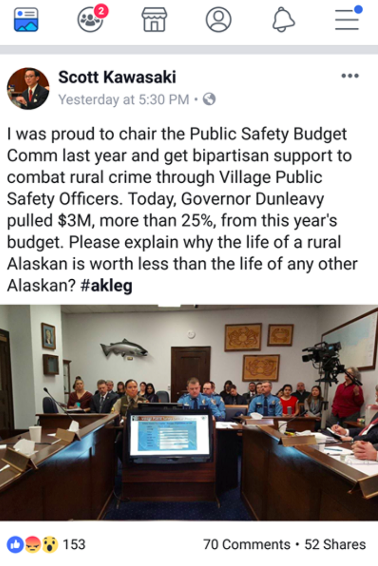(4-minute read) PROGRAM STRUGGLES TO SPEND MONEY ALLOCATED BY STATE
In 2013, the Alaska Village Public Safety Officer Program hit a milestone of 101 safety officers in villages. It took an enormous effort by the Department of Public Safety to build those numbers from the 45 positions filled in 2007.
Earlier in VPSO history, there were as many as 130, but rebuilding the force was a priority of Gov. Sean Parnell, and staffing it to over 100 was a milestone.
But under the Walker administration, the number of VPSOs dropped back to less than 50 in 2018.
Historically, Alaska has found it difficult to retain high-quality paraprofessional police officers because the work is hard, can create conflicts with family members in villages, and recruiting outsiders to work in villages is a herculean task. VPSOs don’t carry guns, and they have little backup. They have a hard time finding housing in villages and when they do, they must sometimes house offenders in their own homes while they wait for Troopers to arrive. There are no jail facilities in most villages.
The VPSO program, started in the 1970s, is managed with help from various Native entities. That helps the State of Alaska manage costs by not having to place these safety officers into the State benefits plan. It shifts much of the responsibility back to the local level as a policing partnership.
The hiring of the VPSOs is contracted to nine Alaska Native nonprofit organizations and the Northwest Arctic Borough. The State trains the officers and pays them, and the budget for the program has been about $13 million for the past three years.
But one third of the positions are routinely empty. And this is the third year in a row the program has lapsed $3 million. In FY17 and FY18, it was also unable to spend the money it was given.
PUSHBACK FROM SENATOR OLSON
As Alaska is more than midway through the 2019 fiscal year, the Department of Public Safety offered $3 million back to the General Fund because it cannot use the money for what the Legislature intended — there are just not enough qualified people to hire in these positions.
The Senate Finance Committee today heard from Office of Management and Budget Director Donna Arduin about the unused VPSO funds that DPS sent back to the General Fund to help with earthquake recovery. The money was allocated for this year, but is unspent and will not be spent, Arduin said. The Dunleavy Administration wants to reallocate it.
Sen. Donny Olson of Golovin was not having it, however.
In committee, he all but blamed the death of Kotzebue’s Ashley Barr in 2018 on not having enough VPSOs, even though there is a Trooper post in Kotzebue, and even though the accused killer was a known perpetrator. Peter V. Wilson’s trial begins on March 25 in Fairbanks.

For all his chest-beating in committee, Olson has not been exactly a budget hawk. He’s the senator who infamously billed the state to move appliances, power tools, a piano, and an excessive number of other household goods north from Juneau, claiming that they were his legitimate household moving items after session ended.
The problem was, there were over 7,300 pounds of goods that went from Juneau to Golovin, but didn’t go the other way. He was shopping and shipping at state expense.
See the shipping Invoices of Sen. Donny Olson
Today, Olson badgered OMB Director Arduin with questions about why she didn’t reach out to the Native organizations who are running the VPSO programs.
She calmly answered that she leaves that interaction to the Department of Public Safety, where it properly belongs. Her role was to ask Departments to look for money they cannot use this fiscal year, and return what they can so the State can use it in areas where it’s actually needed now.
Sen. Scott Kawasaki also got in on the demagoguery, by taking his complaint to Facebook:

Kawasaki’s budget committee was in the House, which was under Democrat control last year, and he is claiming responsibility for the overpayment to the program and the lack of budgetary restraint.
VPSO PROGRAM HAS HEADWINDS
Even though most of the village safety officers are upstanding, hardworking, and honorable, the VPSO program has been fraught with chronic quality assurance failings in the past. Recruiting and retaining is just one of the problems.